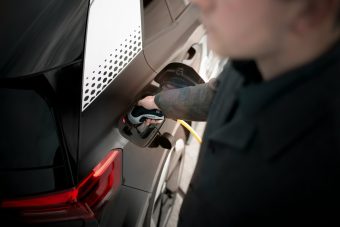
To achieve the desired 15 percent share of electric vehicles in the European Union, the EU adopted the Regulation on the Deployment of Alternative Fuels Infrastructure (AFIR) on April 13 this year, which also binds Croatia.
Therefore, the Croatian Chamber of Commerce (HGK) has formed the HGK Network Operators Group for Electric Vehicle Chargers to become a partner to all institutional actors involved in building adequate infrastructure for charging electric vehicles.
EU member states are obligated to ensure chargers for private vehicles on all main roads every 60 kilometers by 2025, and the same obligation applies to heavy-duty vehicles by 2030. AFIR also aims to equip at least 50 percent of roads connected to the TEN-T corridor with chargers for light electric vehicles by the end of 2027, and all roads by the end of the decade. To meet the Regulation’s requirements, Croatia will need to add 100 to 150 MW to the current 20 MW of connections by 2030.
Additionally, Croatia will comply with AFIR’s requirements until it reaches 200,000 registered electric vehicles. The president of the HGK Group, Dino Novosel, stated that forming the Group comes at a time when Croatia is facing ambitious goals for establishing critical infrastructure for electric vehicle charging.
More:
- THE IMPORTANCE OF FAST CHARGERS IN SUPPORTING ELECTRIC VEHICLE ADOPTION
- CHINA ANTI-SUBSIDY INVESTIGATION: PROVISIONAL DUTIES
- NEW DATA: CO2 EMISSIONS FROM NEW CARS AND VANS FURTHER DECREASE AS ELECTRIC VEHICLE SALES GROW IN EUROPE
“This is an investment cycle of at least 200 million euros which will last until 2030 and stems from the recently adopted AFIR regulation. This investment cycle will contribute to Croatia achieving its goal of increasing the share of renewable energy sources in transport from the current level of below three percent to at least the mandatory 21 percent. The HGK Group, which brings together key industry players, will systematically work on removing regulatory, technical, and operational barriers, as well as positively shape the investment climate in cooperation with other stakeholders in the country,” said Novosel.
The share of renewable energy sources in transport at the EU level was 9.6 percent in 2022, while in Croatia it was only 2.4 percent. The European Union has set a goal of 29 percent, to be met by 2030, as stated in the EU Directive 2023/2413 on promoting the use of energy from renewable sources.
The HGK states that these measures are crucial for ensuring seamless mobility of electric vehicles across Europe, promoting the transition to a more sustainable transport system, which is also a key goal of the new HGK Network Operators Group for Electric Vehicle Chargers. The Group’s work also includes creating frameworks for efficiently directing EU financial resources intended for improving public charger infrastructure over the next decade.
Energetski portal

